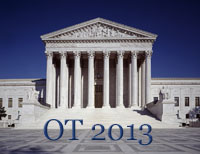 (This is another post in our series, Looking Back at the U.S. Supreme Court’s 2013 Term.)
(This is another post in our series, Looking Back at the U.S. Supreme Court’s 2013 Term.)
This past year has been another active one for labor and employment law cases at the United States Supreme Court. Decisions have ranged from public employee free speech to the collection of dues by public-sector unions to the fiduciary duties owed under employee benefits law when a plan fiduciary invests in company stock. This blog post focuses on the public employee free speech case, Lane v. Franks, No. 13-483 (June 19, 2014), while two subsequent posts will discuss the labor law cases of Harris v. Quinn and NLRB v. Noel Canning, and finally the ERISA case of Fifth Third Bancorp v. Dudenhoeffer.
First, it is necessary to start with a disclosure. I co-authored, and was Counsel of Record, on an amicus brief filed on behalf of over sixty law professors in support of the plaintiff in the case, Edward Lane. We argued that Mr. Lane should have had protections under the free speech provisions of the First Amendment after he was fired allegedly for testifying under subpoena in both grand jury and criminal trial proceedings against a former employee under his supervision. We did not brief the second issue in the case of whether the individual defendant, Mr. Frank, should be entitled to qualified immunity with regard to any First Amendment violations of Mr. Lane’s rights.
More specifically, and as the Supreme Court concisely related the facts:
Director of Community Intensive Training for Youth (CITY), a program for underprivileged youth operated by Central Alabama Community College (CACC), petitioner Edward Lane conducted an audit of the program’s expenses and discovered that Suzanne Schmitz, an Alabama State Representative on CITY’s payroll, had not been reporting for work.
Consequently, Lane was subpoenaed to testify in the criminal prosecution of Schmitz, at both the grand jury and criminal trial stage. Schmitz ended up being sentenced to prison. Shortly after given the testimony, Lane was fired by the president of CACC, Franks. Lane claimed that his firing was in violation of his free speech rights under the First Amendment.
First Amendment free speech claims by public employees are subject to a complicated legal test. Under Garcetti v. Ceballos (U.S. 2006), the employee first must prove he or she was acting as a citizen, and not as an employee pursuant to his or her official duties. Employees speaking out pursuant to their official duties have been found to have no First Amendment protection under Garcetti because they have been hired by the government to engage in that speech and the public employer has substantial discretion in running an efficient government service. Only if the employee is found to be speaking as citizen does the employee get the opportunity to show that he or she was speaking on a matter of public concern under Connick v. Myers (U.S. 1983), and that the employee’s rights to free speech outweigh the employer’s right to run an efficient government service under Pickering v. Bd. of Education (U.S. 1968).
Here, the issue was whether Lane was acting pursuant to his official duties when he discovered that Schmitz was being paid without reporting to work and, therefore, had no free speech protection under Garcetti. Not surprisingly, the Supreme Court overruled the Eleventh Circuit’s decision, and found that testimony required by subpoena is quintessential citizen speech and subject to the First Amendment. Said the Court (per Justice Sotomayor):
Sworn testimony in judicial proceedings is a quintessential example of citizen speech for the simple reason that anyone who testifies in court bears an obligation, to the court and society at large, to tell the truth. That obligation is distinct and independent from any separate obligations a testifying public employee might have to his employer.
The Court clarified that Garcetti did not apply to speech learned as a result of public employment, but only speech that was required as part of the public employee’s official duties. Clearly, Lane’s official duties did not include providing sworn testimony under subpoena.
Although Lane was successful in showing that he could potentially make a First Amendment free speech claim under the various tests enunciated by the Court previously in Garcetti, Connick, and Pickering, Franks, the community college president, was found to enjoy qualified immunity from First Amendment liability. This was largely because the free speech rights of public employees in these circumstances were not clearly established in the Eleventh Circuit because that court had a history of providing an overly-generous interpretation of the Garcetti holding. Nevertheless, the case was remanded on Lane’s claims against Franks in his official capacity as the President of Community College to see if that claim could lead to the relief that Lane sought, including reinstatement and backpay for the First Amendment retaliation he suffered at the hands of the college.
In all, Lane v. Franks clarifies the contours of the Garcetti holding by narrowing it to speech that is actually part of the public employee’s job. As a concurrence written by Justice Thomas points out, the case may well have come out differently if the employee, like a police officer, had a job description which did require him to testify under subpoena. But that is another case for a future date.
The other important point is that the holding of Garcetti, which I have roundly criticized for being overly formalistic in its distinction between public employees speaking as citizens or employees, but never both, was not under reconsideration. My personal hope is that someday the Court will reexamine the Garcetti precedent and recognize the errors it made in unnecessarily narrowing the First Amendment free speech rights of public employees.
